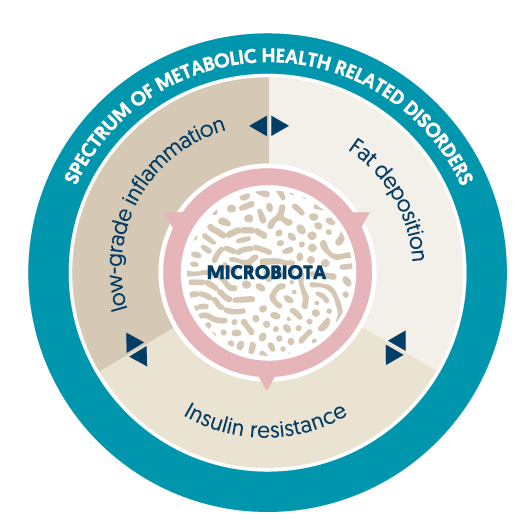Metabolic health

Today, a record number of patients worldwide suffer from metabolic disorders, including obesity, non-alcoholic fatty liver disease, type 2 diabetes mellitus and cardio-metabolic disease. Poor diets, lack of exercise, and other stressors continue to negatively impact millions of people around the globe. Therefore, we must look for new ways to improve metabolic health, delay disease progression, and foster a better quality of life where possible.
The microbiota and metabolic disorders
Currently there is no strict definition for metabolic health. Often it is referred to as the absence of metabolic disease. Rising levels of blood sugar, triglycerides, low-density lipoprotein (LDL) cholesterol, blood pressure, and waist circumference are generally associated with loss of metabolic health and an increased risk for metabolic diseases. This can range from mild insulin resistance all the way to pre-diabetes, type-2 diabetes and cardiovascular disease. Insulin resistance and systemic low-grade inflammation seem to be at the core of these metabolic disorders.
Insulin resistance
Insulin resistance is a condition in which cells are less sensitive to the action of insulin. Thus, the pancreas needs to produce even more insulin to lower blood glucose levels. Over time, the pancreas may no longer be able to cope with the high demand, and prediabetes can progress to diabetes.
Systemic low-grade inflammation is inflammatory activity of the immune system that occurs at low levels and is not allocated to any specific body site. Contrary to short term inflammatory activity after injury or infection, systemic low-grade inflammation is present continuously. This affects proper functioning of our physiology. Over time it leads to build up of damage and increasing disturbance of physiological regulatory systems, such as insulin signaling or immune responses.
Insulin signaling and inflammatory responses interact with one another. Systemic low-grade inflammation causes impaired insulin signaling (i.e. insulin resistance) and vice versa. Moreover, both systems also interact with the gut microbiota, making these systems the trinity of metabolic health.

Potential role of probiotics
Given the role of the gut microbiota on metabolic disorders, targeted probiotic formulations may be clinically relevant for optimizing metabolic health, influencing of insulin resistance and low-grade inflammation associated with early- and late-stage low-grade metabolic disorders, specifically T2DM. Recent literature has supported the efficacy of probiotics for improving a range of metabolic markers, including HOMA-IR, a measure of insulin resistance, and serum LPS, a measure of gut permeability and a trigger of inflammatory responses.